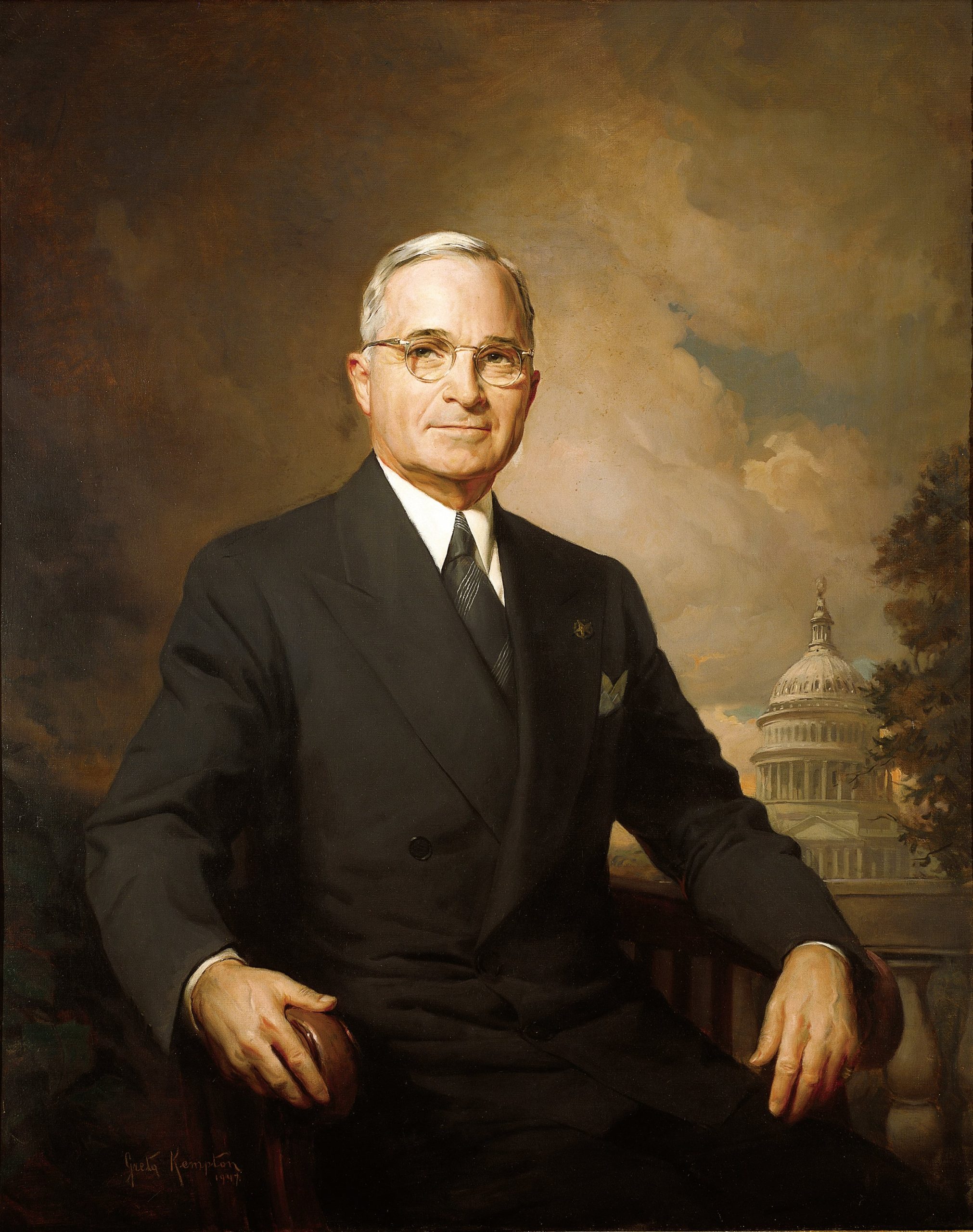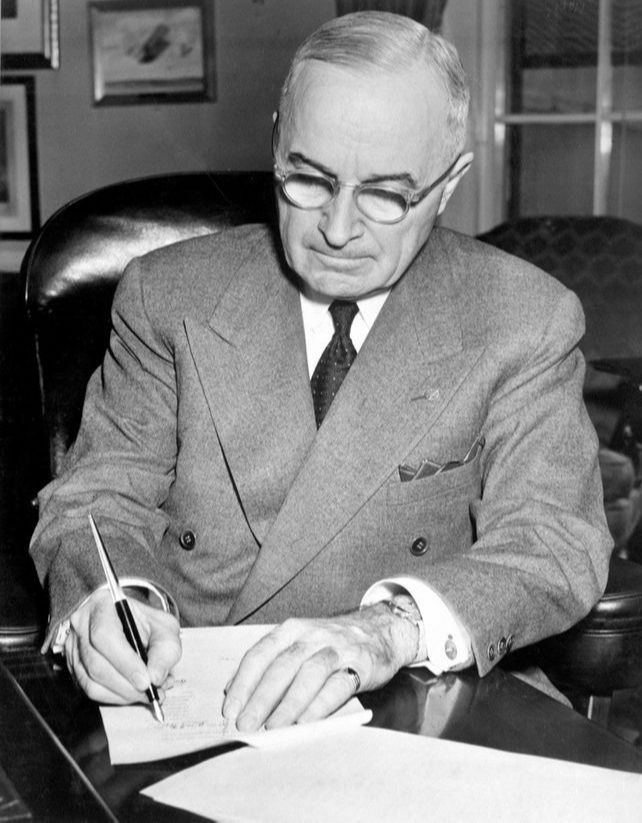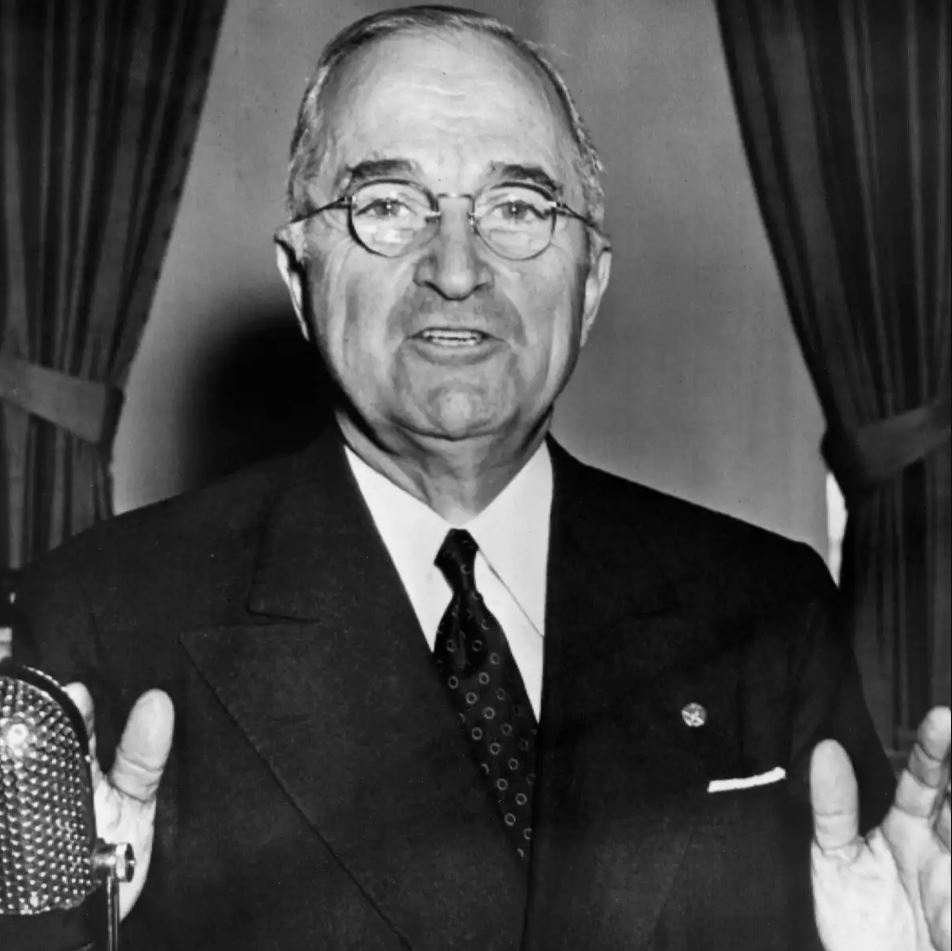The Truman Doctrine Shaping U.S. Foreign Policy in 1947
The Truman Doctrine stands as a landmark moment in the annals of U.S. foreign policy, marking a profound shift in America’s global stance. President Harry S. Truman’s address to Congress on March 12, 1947, heralded the dawn of a new era in American diplomacy. Against the backdrop of the Greek civil war and the withdrawal of British aid to Greece, Truman articulated a doctrine that would fundamentally reshape America’s role in the world.
In his historic speech, Truman outlined a vision wherein the United States would no longer passively observe distant conflicts but would actively engage to support nations threatened by external or internal authoritarian forces. The context of the Greek civil war, exacerbated by the impending cessation of British assistance, served as a crucible for Truman’s doctrine. With Greece teetering on the brink of succumbing to communist insurgency, Truman seized the moment to rally Congress and the nation to action.
The withdrawal of British support underscored the urgency of Truman’s message, highlighting the vacuum left by retreating colonial powers and the looming specter of Soviet influence. Against this backdrop, Truman articulated a doctrine that committed the United States to provide political, military, and economic aid to democratic nations in peril. The Truman Doctrine thus emerged as a clarion call for American leadership in safeguarding the principles of freedom and democracy on the global stage.
As we delve deeper into the intricacies of the Truman Doctrine, it becomes evident that its ramifications extend far beyond the immediate context of 1947. This doctrine laid the foundation for decades of U.S. interventionism and shaped the contours of the Cold War struggle against communism. Its enduring legacy continues to reverberate in contemporary debates over America’s role in the world, underscoring the enduring relevance of Truman’s visionary pronouncement.
| Aspect | Details |
|---|---|
| Context | Greek civil war; British withdrawal from Greece, leading to a vacuum filled by potential Soviet influence |
| Core Principle | Active U.S. engagement in global conflicts to support nations threatened by authoritarian forces (internal/external) |
| Impact | Initiated decades of U.S. interventionism; shaped the Cold War dynamics; continues to influence U.S. foreign policy |
Contents
President Harry Truman’s Address
President Harry S. Truman’s address to Congress on March 12, 1947, marked a pivotal moment in American history, propelled by a confluence of domestic and international factors. The immediate catalyst for Truman’s speech was the announcement by the British Government of its impending withdrawal of military and economic aid to Greece, embroiled in a bitter civil war against the Greek Communist Party. This decision left Greece vulnerable to the encroaching threat of communist insurgency and underscored the growing vacuum of Western influence in the wake of World War II.
Central to Truman’s address was the specter of Soviet expansionism and its implications for the stability of Greece and Turkey. Truman articulated deep concerns regarding Soviet efforts to exert influence in the region, viewing the Greek civil war as a microcosm of a broader ideological struggle between democracy and communism. The Soviet Union’s perceived support for the Greek Communist war effort heightened fears of Soviet encroachment into the Eastern Mediterranean, posing a direct threat to Western interests.

Beyond the immediate crisis in Greece, Truman’s address shed light on the broader foreign policy challenges facing the United States in the post-war era. The failure of the Soviet Union to adhere to international agreements, such as the Tehran Declaration of 1943, and its aggressive tactics in Iran and Turkey raised alarms about Soviet intentions and ambitions. Truman viewed these actions as part of a pattern of Soviet expansionism, necessitating a robust response to safeguard American interests and uphold the principles of democracy.
| Factor | Details |
|---|---|
| Immediate Catalyst | British withdrawal of aid to Greece, which was facing a communist insurgency and increased vulnerability. |
| Geopolitical Context | Concern over Soviet expansionism in Greece and Turkey, and broader fears of Soviet influence in the region. |
| U.S. Foreign Policy Shift | Response to perceived Soviet actions and non-compliance with international agreements like the Tehran Declaration. Aim to uphold democracy and counteract Soviet strategies. |
Justification and Key Principles of the Truman Doctrine
Truman marshaled a series of justifications for his doctrine, rooted in both strategic and ideological imperatives. Firstly, Truman emphasized the strategic importance of Greece and Turkey as bulwarks against Soviet influence in the Eastern Mediterranean. He argued that the fall of Greece to communism would not only imperil the stability of Turkey but also threaten the broader geopolitical balance of power in the region. Thus, aiding Greece and Turkey was portrayed as essential for preserving American interests and maintaining stability in a volatile region.
Furthermore, Truman framed the Truman Doctrine within a broader ideological struggle between democracy and totalitarianism. He articulated a moral imperative to support “free peoples” resisting totalitarian regimes, casting American intervention as a defense of liberty and democratic values. Truman warned that the spread of authoritarianism posed a grave threat to international peace and security, undermining the very foundations of the post-war order established by the United Nations.
Truman’s assertion that the spread of authoritarianism threatened global stability resonated with Cold War anxieties, reflecting a belief in the interconnectedness of international affairs. He argued that the United States could no longer afford to adopt a passive stance towards Soviet expansionism, as the security of free nations was intrinsically linked to America’s own security. By intervening to support Greece and Turkey, Truman sought to stem the tide of Soviet influence and uphold the principles of democracy in the face of totalitarian aggression.
| Justification Category | Details |
|---|---|
| Strategic Importance | Greece and Turkey seen as crucial to countering Soviet influence in the Eastern Mediterranean; essential for maintaining regional and global balance of power. |
| Ideological Battle | Framed as a struggle between democracy and totalitarianism, emphasizing the moral imperative to support “free peoples” resisting authoritarian regimes. |
| Global Stability | Highlighted the risk of authoritarianism to international peace and security, asserting the interconnectedness of global stability and U.S. security. |
Policy Implications and Shift in U.S. Foreign Policy
Truman’s impassioned plea for substantial financial aid and military support to Greece and Turkey signaled a significant departure from traditional U.S. foreign policy. The Truman Doctrine represented a break from the nation’s historical reluctance to entangle itself in distant conflicts not directly related to its own security interests. By committing to provide assistance to nations facing internal or external threats to democracy, Truman expanded the scope of American interventionism on the world stage.

This shift in U.S. foreign policy marked a decisive turning point in American geopolitical strategy. No longer content to stand aloof from global affairs, the United States embraced a proactive role in preserving the political integrity of democratic nations. Truman’s doctrine laid the groundwork for a new era of American leadership, characterized by a willingness to intervene militarily and financially to counter perceived threats to freedom and democracy.
The Truman Doctrine’s commitment to intervene in distant conflicts to uphold democratic principles reflected a broader ideological struggle against communism. By framing the defense of democracy as vital to U.S. national security, Truman justified a policy of interventionism aimed at containing the spread of Soviet influence. This interventionist approach would shape U.S. foreign policy for decades to come, influencing American involvement in conflicts around the world.
| Element | Details |
|---|---|
| Policy Departure | Truman’s plea marked a shift from the U.S.’s historical reluctance to intervene in distant conflicts unrelated to direct U.S. security interests. |
| New Geopolitical Strategy | The U.S. adopted a proactive role in global affairs, committing to support nations facing threats to democracy both internally and externally. |
| Impact of Interventionism | Framed as essential for containing Soviet influence, this new interventionist approach shaped U.S. foreign policy and its involvement in international conflicts for decades. |
Legacy and Impact
The immediate impact of the Truman Doctrine reverberated throughout U.S. foreign relations, as Congress swiftly approved the requested aid package for Greece and Turkey. This demonstrated a bipartisan consensus in support of Truman’s vision and signaled America’s readiness to assume a leadership role in the post-war world order. The Truman Doctrine set a precedent for American interventionism and established a framework for future foreign policy decisions.

In the long term, the Truman Doctrine had profound implications for U.S. global engagement and interventionism. It laid the groundwork for the policy of containment, which guided American strategy throughout the Cold War. By committing to resist the spread of communism, the United States embarked on a path of sustained military and diplomatic involvement in regions threatened by Soviet expansionism. This interventionist approach shaped U.S. foreign policy priorities and alliances for much of the 20th century.
Moreover, the Truman Doctrine played a pivotal role in shaping the Cold War geopolitical landscape. It signaled America’s determination to confront Soviet aggression and defend the principles of democracy and freedom. The doctrine set the stage for subsequent initiatives such as the Marshall Plan and NATO, which further solidified Western resolve against Soviet encroachment. Ultimately, the Truman Doctrine’s legacy endured beyond the Cold War era, serving as a touchstone for debates over American interventionism and the promotion of democratic values in the international arena.
| Impact Type | Details |
|---|---|
| Immediate Impact | Swift Congressional approval of aid for Greece and Turkey, reflecting bipartisan support and America’s readiness for global leadership. |
| Long-Term Strategy | Laid the foundation for the containment policy, driving U.S. strategy during the Cold War to counteract Soviet expansionism through sustained military and diplomatic efforts. |
| Cold War and Beyond | Influenced key initiatives like the Marshall Plan and NATO, shaping the geopolitical landscape and enduring as a reference point in discussions on U.S. interventionism and democracy promotion. |
The Truman Doctrine stands as a cornerstone of U.S. foreign policy, reshaping America’s role on the global stage. Truman’s bold assertion of American leadership in supporting democracy against totalitarian aggression marked a paradigm shift in international relations. The doctrine’s enduring legacy reverberates through decades of U.S. interventionism and commitment to promoting freedom and democracy worldwide. Truman’s vision continues to shape contemporary debates over America’s role in the world, underscoring the enduring relevance of his doctrine for international relations and the pursuit of a more just and secure world order.
Global News -Ahead of NFL Draft Denver Broncos New Uniforms Leaked
Basketball Stars Paige Bueckers and Kamilla Cardoso
Uniform Unveiling amidst Dallas Cowboys Trade Rumors
Kenley Pope Rising Star in Competitive Cheerleading
Duane Allman Death The Tragic Loss of a Guitar Legend
RCMP Probes in Bass River Sudden Death, Nova Scotia
String Cheese Incident Mexico A Luxurious Concert Getaway